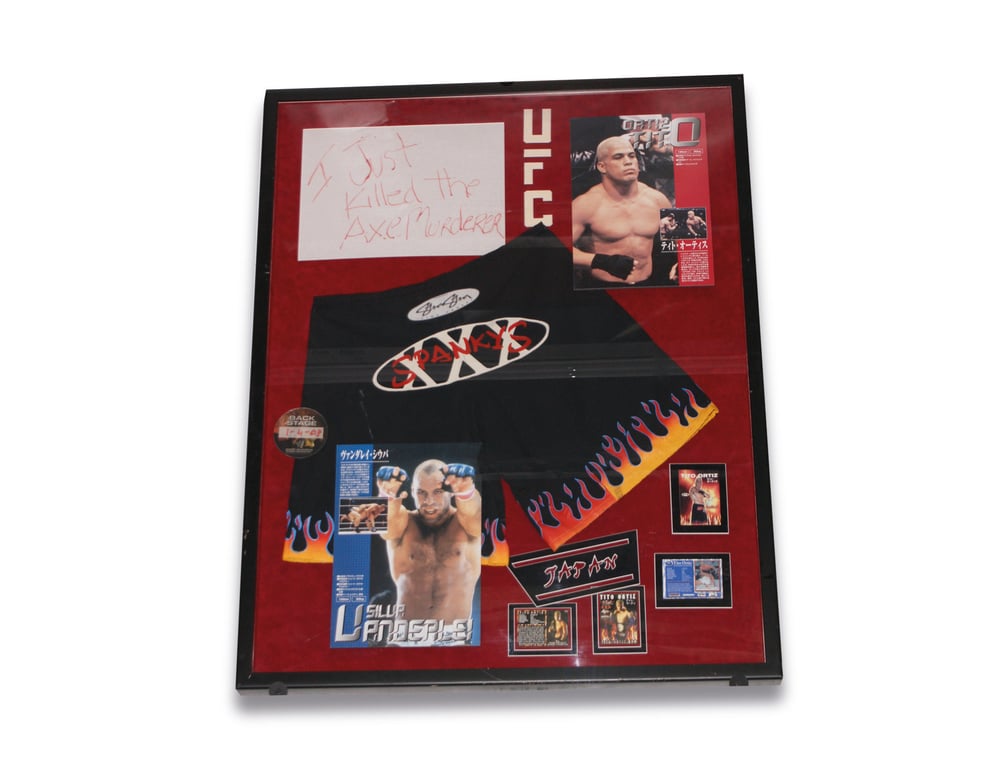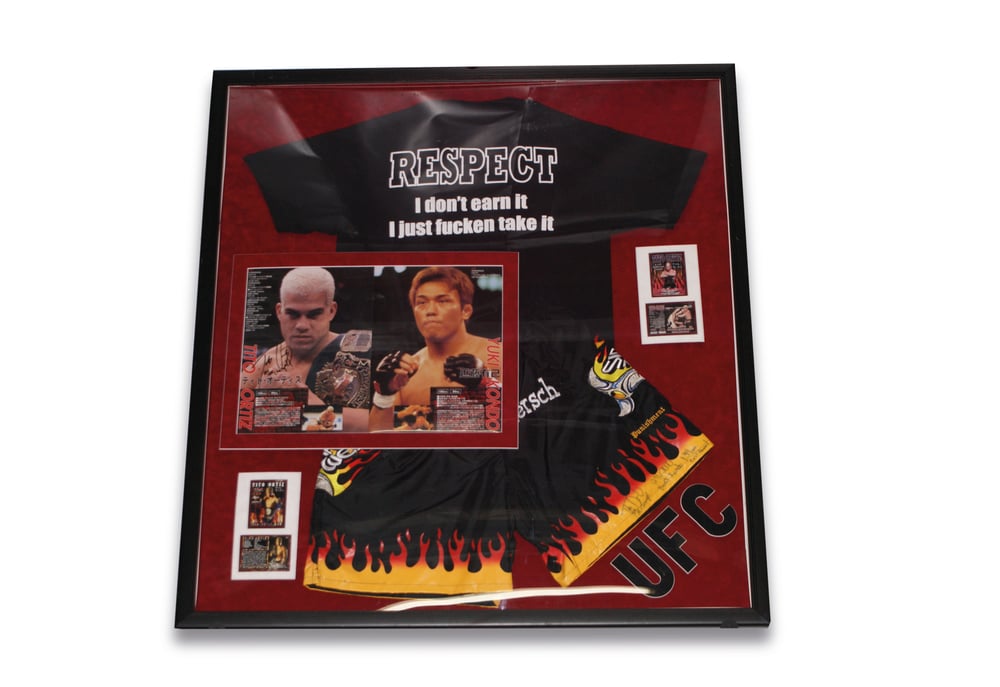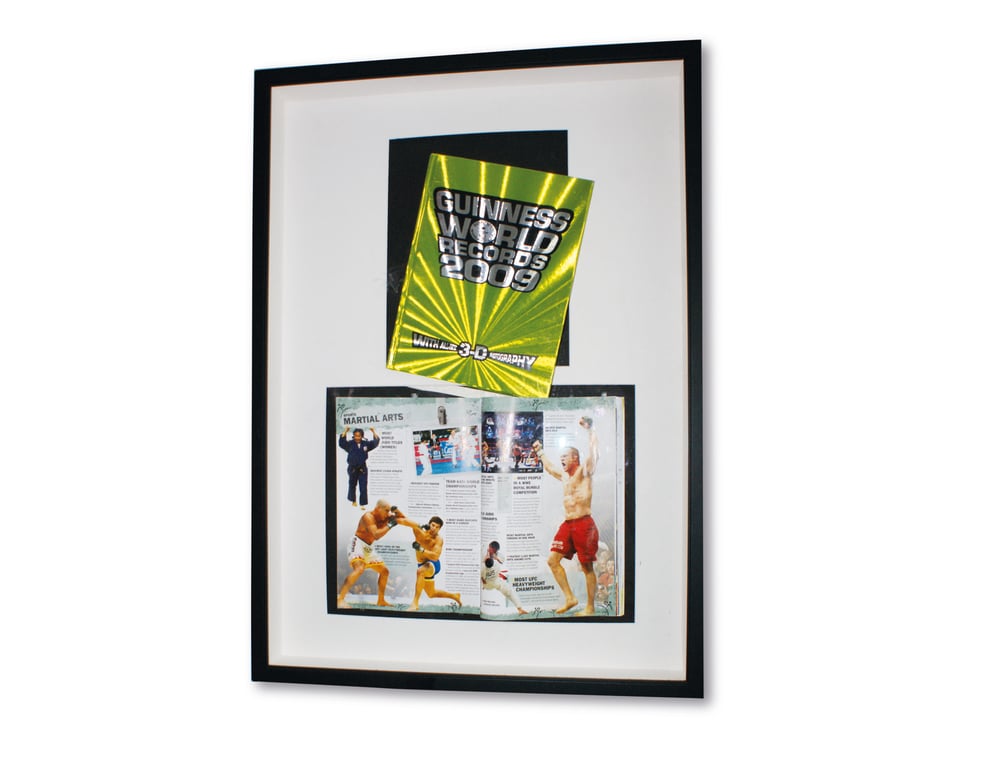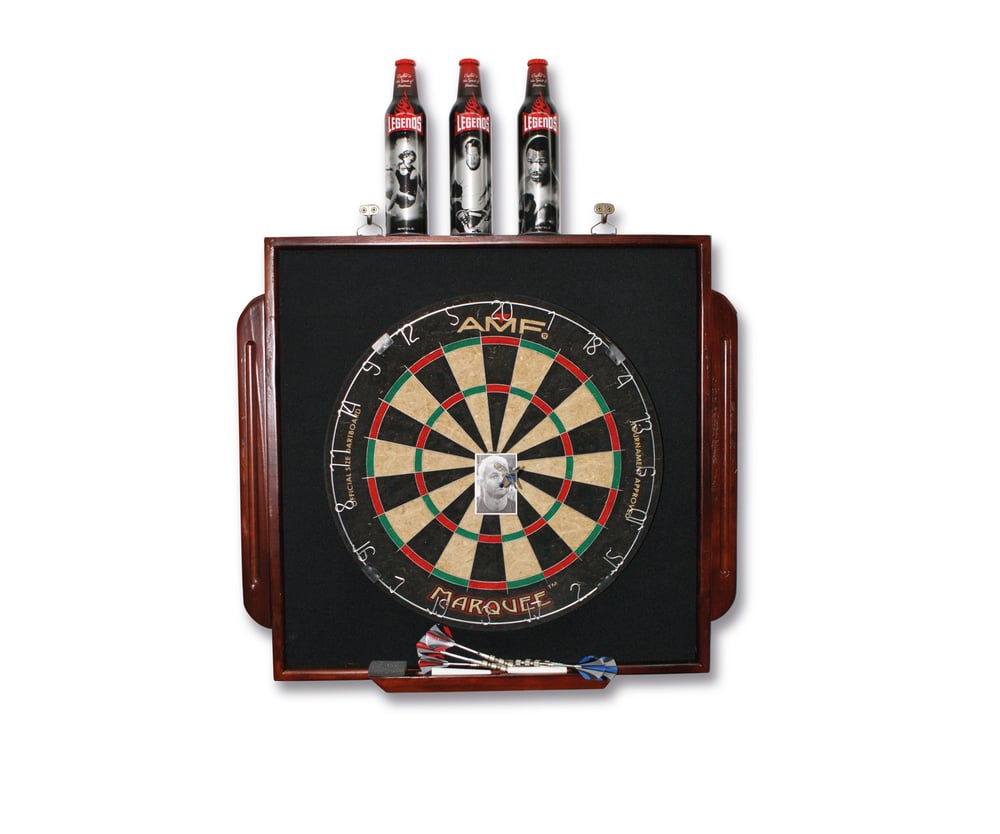
Issue 095
December 2012
Tito Ortiz, as told by those who know him best of all
JOYCE ROBLES
Tito’s mother
“Tito was such a big baby. People would ask, ‘Are you having twins?’ And I would reply, ‘No, I just have a champion in here.’ Growing up he used to tie a towel or a shirt around his neck and fly through the house like a superhero. ‘Here comes Tito Ortiz,’ he would shout. He was just a cute kid. I think back then he understood that to stand out you had to stand out. He would say to me, ‘You have to have a gimmick, mom.’ He had to be different. He had to put on a show.
“We would take him to rock concerts, and he saw everybody when he was a child, Joe Cocker and all these people, and he loved that entertainment. Then when he started to wrestle he added some of that into his style. He would never just go up there and win quick, as there were so many other people fighting. He wanted to make sure he stood out and that made him important.
“Then he started dying his hair too. He would just by that cheap nasty stuff from the store and pour it all over his head to dye his hair. I’m surprised it never all fell out, as you can’t just do stuff like that, but he would. He wanted to be different. It all came with the game, and it was all worth it. Sure he was cocky too, but it was all worth it.
“He grew up watching his older brother wrestle, we used to go to his matches, and Tito loved it. He was always a big kid. He was never fat, he always had a small waist, but he was blessed with a big, strong body. Even at eight years of age he had muscles. And he was a worker, he always has been. He’d work every job he could get. He always wanted to make money, from breakdancing down at the pier to bating hooks, you name it he did it – all just to make change.
“We weren’t a poor family by any means, not at first. But then we lost everything because of drugs and to have everything taken away like that I think affected Tito, so first chance he got to earn money for himself he was out there.
“I’m so proud of him, and he deserves everything he has because he’s worked so hard for everything. The thing is, Tito took his career so seriously. He never cut corners and never messed around.”

ROB MCCULLOUGH
Ex WEC 155lb champ, friend and training partner
“I’ve known Tito since high school, since I was 14 – I’m 35 now. He’s evolved since then. I completely knew a different person. He’s been there and he’s done that. Now it seems like he tries to help people out: if it’s up-and-coming fighters or his kids. He’s very compassionate.
“I started in kickboxing right when I was getting out of high school. He was always a wrestler and then he went to college and I stayed and started fighting. I was working at an ‘LA Boxing’ gym, I remember I had one of my fights, it was on TV, and I was watching it and I saw his fight right after. And I was like, ‘No way. I remember Tito. That’s awesome.’ He came down probably a month or two later and was like, ‘Hey, I’m going to start training at this gym.’ I was like, ‘We should train together.’ I would go run every day, I’d run five miles, and I asked him, ‘Where do you run?’ He says, ‘I don’t run.’ ‘You don’t run? You should run.’ So we started training together, then he was like, ‘Do you want to show me some stand-up stuff?’ I was like, ‘Yeah I’ll spar with you.’ It was fun because he didn’t know any stand-up so he just tried taking me down. I said, ‘If we’re going to do stand-up no taking me down.’
“I have to attribute me starting MMA to Tito. He kept telling me, ‘You’ve got to come to the dark side.’ Because all I did was stand-up. He kept going, ‘You’ve got to come over here and start grappling and doing submissions and wrestling and stuff.’ I was like, ‘Nah, I’m not really into it.’ So, to this day I still go, ‘Hey, man, thank you for telling me to come do that.’ Because I didn’t see the full picture. He kept going, ‘Man, mixed martial arts is going to be huge.’ At the time we called it no holds barred. ‘It’s the sport of the future.’
“I still thank him for that because I’m still making a good living doing this, and having fun teaching it and still fighting. I owe him because he was the only one who was pushing me to come compete in MMA.”

JOSH BURKMAN
UFC veteran, friend and training partner
“I ended up spending about a year [in Big Bear with Tito] and those guys, training, and we became great friends. Tito gets harsh criticism from some fighters and this and that, but Tito is a superstar. He wasn’t going to hold your hand and take you anywhere, but when he was in training camp, he bought the food, and he took care of guys so well. After the training camp, Tito did Tito, but during those times in camp, I’ve not been around another fighter who took care of his guys better. He was solid, and he helped me out a lot.
“Tito taught me a lot of cool things: tricky, little vicious elbows and things like that. But we came together as a group. We cooked together. We ate dinner together. We jogged in the mornings together. And what Tito taught me was getting up and running every day.
“There would be mornings where I didn’t want to get up and run. That would be about once a week. But he had me running every day, and if I was sitting there eating breakfast, he’d say, ‘Hey, I’m not leaving without you.’ That’s when I learned to run every day. If you run five times a week and finish with hills on Saturday, you know you’ll never get out of shape. Tito taught me that in training camp, and I’ve taken that all the way with me to this day. There were a lot of other things, too, but that’s one I take with me.
“Tito was one of the first guys I was watching in high school and going, ‘Oh, man. This dude is bad.’ He did so much for the sport at the time, and that should never, ever be forgotten.”

BAS RUTTEN
UFC and Pancrase legend
“When Tito fought Frank Shamrock (UFC 22, 1999), he lost that fight because he ran out of gas. I hope he remembers this, but on the way from the hotel to the airport, I shared the van with him. We started to talk, and I told him that conditioning was the number one skill fighters needed. I told him about some drills, and we left it at that. When he fought his next fight against Wanderlei, well, he won that because he was in super shape. After that, we never saw a tired Tito Ortiz again, he took his training to the next level. I really admire people like that, people who learn from their mistakes, because, let me tell you, some fighters never learn.
“The way Tito presents himself to the public, is very classy. Sure he used some crazy language in the past, but those were his bad boy times. The ‘Huntington Beach Bad Boy’ became a man with great values and a role model to kids.”

SAUL SOLIZ
Head coach from 2004 until 2011
“I remember when Tito and I went to the UFC Fan Expo in Houston. Tito was the first guy to get there to sign autographs and the last guy to leave. He wasn’t going to let anybody sit in line and not get his autograph. They had already shut the place down, they had to kick us out. And he had a hectic schedule at that time. He’s done that at every expo, every convention, every fight, he will stay until the last person’s left.
“And that’s what makes him an icon because you think you know what to expect when you meet him, and he always leaves a better impression than you came with. And I think that’s what makes him great. He really cares about the fans.
“What’s more, he was always trying to get better for every fight. He was never complacent. He always tried to get better. He was a student of the game.
“His injuries, they were enough to pull out of every fight, and he stayed in every fight. [For his last fight] he had a meniscus tear and he got surgery a few weeks before the training camp started and the rest of the time he suffered through it as it was healing. He tried to do as much as he could relative to what he knee would allow. Was it the best camp? No, it wasn’t the best camp, but at the same time, he showed more heart, more perseverance than he showed in just about any other camp.
“Today I think he’s less naïve [than when he started]. When he got into this, he had the same dreams and aspirations as everyone. I think his goals and aspirations changed as he got older. And he understood, with his championship came a lot of responsibility and a lot of people depending on him. If nothing else, he definitely became more responsible.”

MARC RATNER
UFC vice president of regulatory affairs, former NSAC executive director
“The first fight the Nevada State Athletic Commission held in Nevada after we approved MMA was Tito’s title fight with [Vladimir] Matyushenko (UFC 33) in September 2001. I usually got to the arena about an hour and a half [early] as an executive director. The fights start about 5:00pm, I got there about 3:30pm or so. I was amazed that the doors, when they opened them, there was 4,000 or 5,000 people who came before the fights started. That was so different than the boxing world. Tito headlined that card.
“When it comes to describing Tito: charismatic, always whatever the commission asked him for he complied with, very much a credit to the sport and certainly one of the pioneers. He’s very well deserving to be in the UFC Hall of Fame.
“As all of us have, he’s matured, but he never lost his fire. I thought, in that regard, he may have become more grown up in a lot of ways but he still was a fighter first. He survived the hard upbringing and I’m proud of him to where he is today and now he’s going to give back to the sport.”
...









